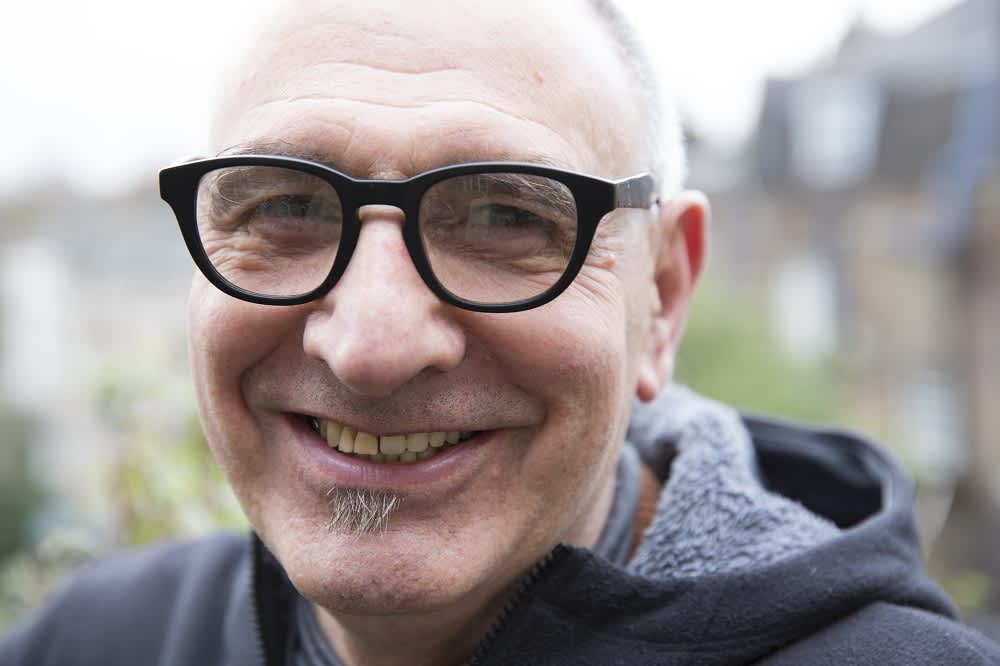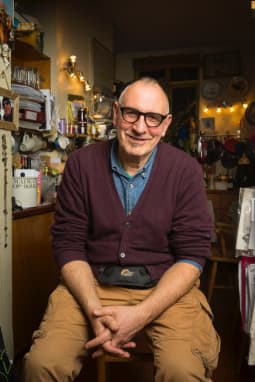Jonathan Blake talks to Sam Bennett about sewing for the opera, being diagnosed with HIV in 1982, and his return to acting.
It’s an embarrassing start to my conversation with Jonathan Blake. With mention of Dominic West – who plays a character inspired by him in the 2014 film Pride – on my question sheet, “Hello, is that Dominic?” I say when he answers the phone. “This is Jonathan,” he replies as I mouth an expletive at a colleague. From his front room in Herne Hill, he graciously accepts my explanation and apology, and I continue to talk about West. One great scene in Pride – Stephen Beresford’s retelling of a group of lesbians and gay men who 35 years ago raised thousands for the striking miners of South Wales’ Dulais valley – sees the actor nail it on the dancefloor of a miners’ welfare hall to Shirley & Company. “There is a photograph of me clapping my hands in glee in the miner’s welfare in Dulais in December 1984,” says the former member of LGSM (Lesbians and Gays Support the Miners). “That one photograph, taken by a wonderful woman called Imogen Young, became two and a half minutes of ‘Shame, Shame, Shame’. I did dance but not as spectacularly as he did.”
The first time Pride was screened, he says, was a showing for members of LGSM and the mining community they’d supported – “People came up from Dulais who one hadn’t seen in ages, which was amazing.” Were any aspects of the Matthew Warchus-directed picture, which touches on Blake’s HIV diagnosis, hard to watch? “I found it really difficult,” he says, for he felt the weight of all those who had died of Aids while he was lucky enough to still be alive. Plus Beresford had written something in the credits that made it seem as though he “was the only person in the whole wide world who had ever been diagnosed with HIV. I said ‘you can’t say that, you just can’t say that.’ I got really upset.” The film, about to go to Cannes at the time, was still being edited. The writer told him not to worry, it would be changed. Having struggled to sit through it the first time, Blake later went to the screening for the cast and crew. “It was brilliant,” he states of Beresford’s piece, “he’d done us proud.”
He appears in the documentary After 82. Appropriately narrated by Dominic West, it’s about the HIV/Aids pandemic. He was diagnosed with HIV – then called HTLV3 – in ’82, the first case at Middlesex Hospital, his number there ‘L1’. He was 33. In the week he turns 70, he tells me of the fury he felt over the Concorde trial he declined to take part in. A cohort of HIV patients was split, he says, half of them took AZT and the other half were given a placebo. “I just asked the question: ‘are you going to match me up with someone of a similar metabolism or build so that either I get the pill and they get the placebo, or vice versa?’ They went ‘oh no, that’s too complicated.’ ” He told them if they couldn’t be bothered to do a proper trial, he couldn’t be bothered to be in it. The daily dose of AZT killed people, he says, then telling me the professionals knew what the “failed chemotherapy drug” did. “That’s what makes me so angry. They knew it wiped out an immune system because that’s what old chemotherapy drugs used to do. It leaves you totally open to any opportunistic infection that’s floating around. I think that anger kept me going.”
Still, at the end of the decade came his Aids diagnosis and a life expectancy of three months. His CD4 T cell count fell to 200 and he “really did freak”. He was offered anti-retroviral therapy (ART), but “still seething with anger around AZT”, he was not willing. “I sort of stalled. I remember thinking ‘what on earth am I going to do?’” For 14 years he survived on antibiotics, but had to start on ART in 1996 – “My health gave out.” Twenty-three years on, he considers the most significant thing to have happened regarding HIV treatment to be U=U (Undetectable = Untransmittable). If you are on effective treatment for HIV and have an undetectable viral load, you can’t pass it on. “When I was diagnosed in those early days, I felt like I was a modern-day leper. I had this killer virus coursing through my veins, who was going to want to know me? My libido was on the floor – I wanted sex but I didn’t want to have sex because I didn’t want to infect anyone. To have this notion that if you are on treatment and are undetectable, you cannot pass that virus, is psychologically incredible.”
It will hopefully help eradicate the stigma attached to HIV, “a hangover” from the ‘Don’t Die of Ignorance’ campaign (1986) which he says instilled fear rather than gave information. Then “the right-wing press vilified gay men as though we were just the devils that were going to wipe out civilisation. It was appalling what they did to us and the way we were treated, and the way HIV-positive people were treated.” After 82 and other such projects can help “break down ignorance. We can start to get the message out and people can get educated – there’s been so much misinformation.”
Is he generally enthused by the current position of LGBTQ+ rights? “We’ve made remarkable strides, but they could be wiped out if we’re not on our guard. People are always out to get us. They still think we’re pederasts, a threat to society. The right-wing is right there waiting.” Though not wanting them to dwell on it, young LGBTQ+ people should also know about their community’s history, he says, concerned that “people who love the freedoms they have don’t really understand where they came from, how hard fought-for they were. They think it’s a God-given right that they can club and party but the reality is it isn’t. Yes, it’s a human right, but when push gets to shove, human rights are way down the list.”
With September our Style Issue, I ask about his retraining as a tailor, a pursuit he followed after his HIV diagnosis. It stemmed from a policy Ken Livingstone implemented when leader of Greater London Council, by which the unemployed could pay £1 for courses at the likes of City Lit and Morley College. In a pattern-making class at the London College of Fashion, a tutor suggested a three-year City and Guild tailoring diploma. “I thought ‘I should be dead before I finish that, but why not.’ For me the most important thing was to keep busy, if I could keep busy, I reckoned I could outrun the virus.”
He completed the course “and didn’t know what I was going to do. Somebody said ‘I could get you an introduction to English National Opera wardrobe.’ I love opera, so thought ‘fabulous’.” Nervous and armed with his portfolio in the ENO men’s workroom, awaiting his interview, he came across a letter on the noticeboard from St Mary’s Hospital in Paddington. It was a letter of thanks to “everybody in the workroom for all their support of this guy called Peter, the men’s cutter, who had just died from HIV/Aids. I thought ‘I want to work here because it will be a safe place. It’s not like I’m going to tell them, but when I get ill they’ll understand.’” He became employed on a full-time freelance basis, and later joined the staff – “what I wanted, because I wanted sick pay, I knew I was going to get ill.” He was indeed medically retired in ’96 after getting shingles on the phrenic nerve, and “kind of took against my sewing machine”. He doesn’t make garments anymore. “I don’t know,” he says, “it’s difficult. I like clothes, I like fashion, but sometimes it can drive you mad.”
Insofar as acting goes, in 1981 he “felt the theatre had given me up. I’d had 18 months out of work and then I got ill.” Recently though, Patrick Cash contacted him to ask if he’d partake in HIV Conversations, a series for which the writer spoke to people living with the virus. “Always interested to talk”, the pair met three or four times. “I just told him my story so he could formulate questions for the conversation. We did it and it went down really well – he used to do them in the MediCinema in the Chelsea and Westminster Hospital.” Eight weeks later, Cash emailed him about a new set of monologues he’d penned, The HIV Monologues, asking if he’d have a look at the character Barney. Reading, Blake saw ample parallels with his own life. “The penny dropped. Everything I had told him he had brought into Barney. Fabulous.” He would then join some rehearsed readings, before Cash asked if he’d do full performances. “I thought ‘yeah, I can do this’ and suddenly I was back in acting.” After a lengthy run of those shows, he worked with Cash again, as Francis in The Grass Is Always Grindr.
Add to that his involvement with London LGBT+ singing group, The Fourth Choir. Pride had just been released and the group’s Séamus Rea requested he be in their Christmas concert, speaking about his life supported by the choir’s rendition of ‘Bread and Roses’ (a beautiful version of which features in the film). In the second half of the show he read part of Dylan Thomas’ A Child’s Christmas in Wales – somewhat fitting for his mother was born in Swansea. Since then he has co-narrated the choir’s Love is Love concert at the Sam Wanamaker Playhouse, as well as co-narrating Stonewall Warriors which played Heaven in June to mark the 50th anniversary of the Stonewall riots, and Antwerp Queer Arts Festival in August.
“Come Sunday I’m going to be 70,” he laughs. “I don’t believe that.” There was a time when he didn’t think he’d reach the age of 40, and even attempted suicide in the year he was diagnosed HIV-positive. For his 40th, he had a party at the home he still resides in today. “There were loads and loads of people from ENO, plus people I was at drama school with back in ’67-70.” Still in contact with such friends, the party is being recreated for the coming Sunday, when 150 guests will fill the interconnecting gardens of his own house and those of his neighbours. “There are no walls,” he says, “it’s this big communal space and it’s just fantastic. Seriously, if you find you’re at a loose end, come by.”
I couldn’t in the end. Maybe it was for the best – God only knows who I would have addressed the card to.
After 82 (Central City Media) is available via home entertainment now.










